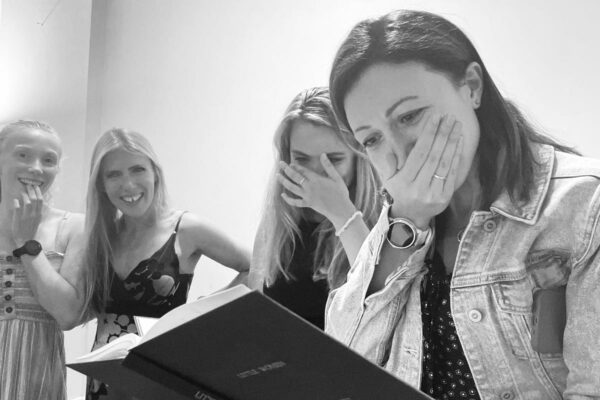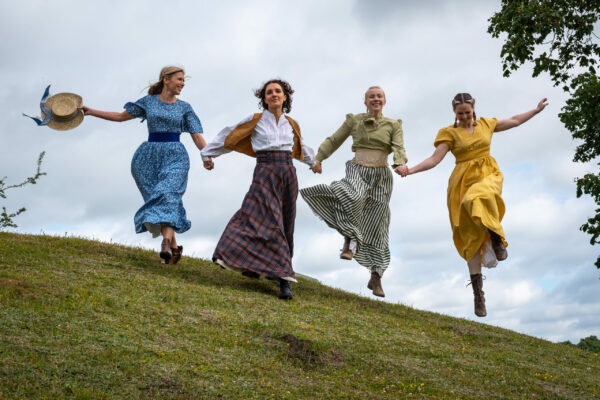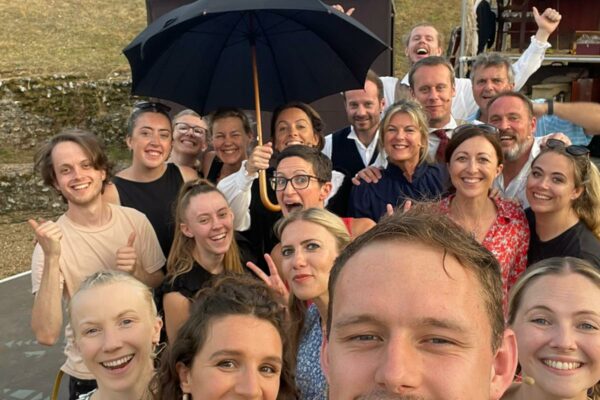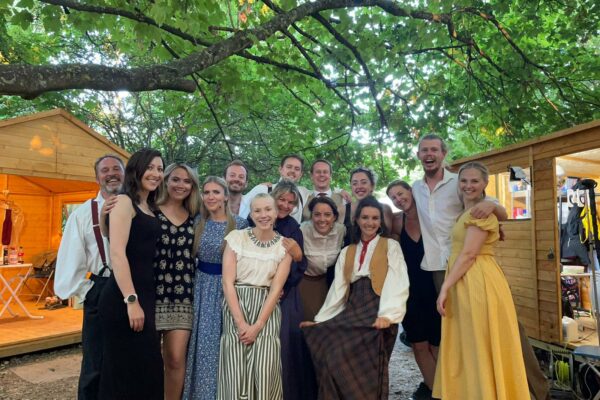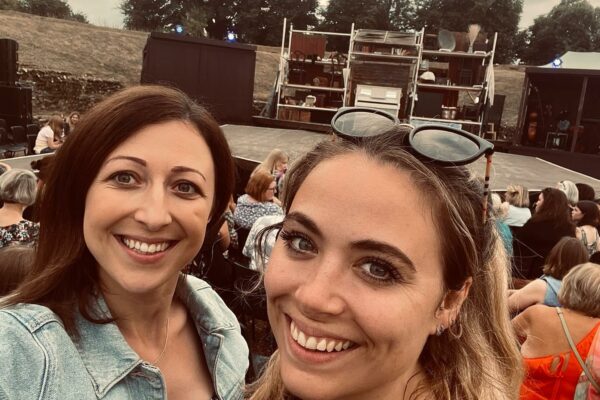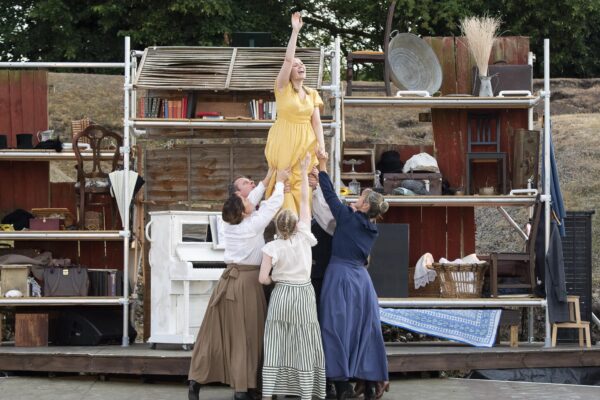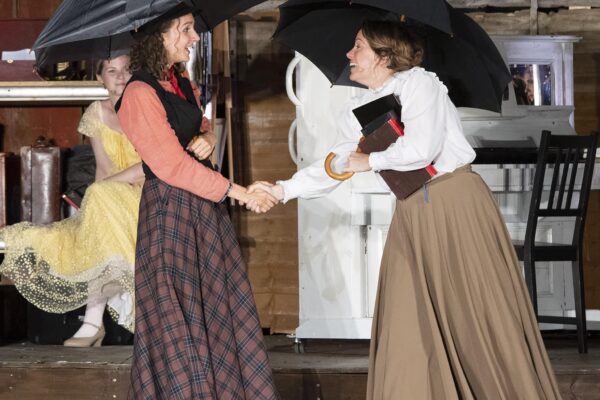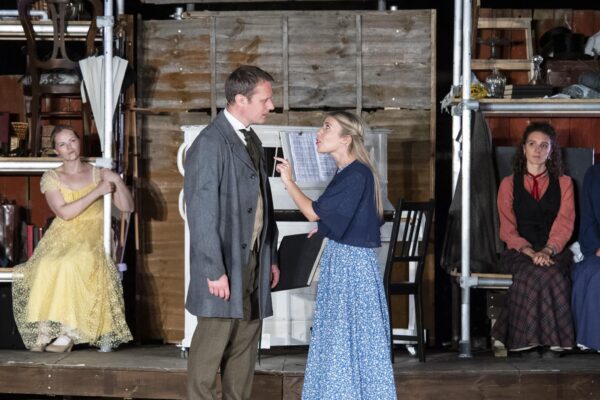This article provides insight into the directing style and ways of working of two of our amazing directors, Stephanie Allison and Amy Connery, who will be directing ‘Little Women’ and ‘Romeo and Juliet’ at The Open Air Roman Festival 2023.
An Insight Into Directing Style
Little Women
Romeo & Juliet
Stephanie Allison
& Amy Connery

How long have you been directing for? Can you tell us about your first production?
We have been directing together since 2018, however both of us had previous directing experience prior to that.
Our first production we directed together was ‘Poison’ by Lot Vekeman. It is a beautiful piece, a two hander about a couple asking the question if they could ever move on from grief. It was claustrophobic and compelling and the silences spoke as much as the dialogue.
I can remember us meeting to discuss and develop our concept and knowing we would not go fully naturalistic in trying to create the room they meet. This has been true with all our productions so far. We do not necessary look to spoon-feed the audience.
We also introduced small moments of movement and music. Something again, that has existed in every piece for us. We used movement to transition into scenes and show the time lapsing. We have always firmly believed a transition should not be wasted when there is so much more that can be said through some movement.
We love working in the detail and the ‘what if?’, when we direct. Asking ourselves:
- What if we didn’t all play this as you first expect for the actor and the audience, what if we searched deeper?
- What happens if you don’t shout the line you first expected to but it’s a whisper, or its uncertain?
- What if one of the actors leaves the stage during an argument and there is silence?
- What if the actor does not look at the other person during a really important moment?
- What if they don’t physically connect on the line you thought they would but connect after?
We believe that all of this exploration helped us and the actors explore ideas further and took us away from playing to hopefully more being.
How would you describe your Directing process from the planning stages, to the rehearsal room and to the stage?
We both studied Drama at Exeter University and our process for creating and devising theatre often starts and continues with the same approach. We have worked together as creatives for nearly 5 years and have a great friendship that underpins our work and trust in each other.
When we are writing scripts we divide the scenes. One writes and the other edits. We would always openly challenge the others work too.
Neither of us are precious with our work, as Faulkner once said: “kill your darlings”.
We always retain the right to change our mind and our ideas as we know that inspiration continues throughout a process and can come from the most unexpected
places. We must always be open to receiving that inspiration. For some actors they will love the variance and opportunity this can bring, but we also appreciate this way of working is not for everyone.
When we are in the rehearsal space we tend to do everything together, but also split our time to be the most effective we can be. We work collaboratively, bouncing and developing ideas together and with our cast. We share all ideas with each other and try almost everything. We can comfortably agree and dismiss an idea or cut a scene. We feel very lucky to have this relationship.
How would you describe your personal Directing style/niche/approach? What makes you passionate about this particular style of directing?
As we mentioned earlier, I think we look for the opportunities everywhere on stage, no move or element of performance is too small that it should be overlooked. So to that end, we will try to pay every detail the same consideration. For us, the audience read the performance like a book and every detail says something to them.
In the way film does, what we find very interesting is the ability to draw the audiences eye to a very specific moment and then just as quickly expand their view back out to the stage as a whole. It’s about finding those individual moments that resonate and then the big ensemble moments which creates drama, pace and excitement and allows us to keep the audience on their toes.
It’s very important to us that the audience are with us at every moment and we keep that level of attention throughout.
We love to do that in performance, but also in the way we write. For us, it’s about looking for the personal in the political. We always want our audience to relate to the personal moments of the characters but to also look at the bigger political context, whatever that may be.
What would you say are your personal values in the rehearsal room?
It is about creating trust. A practitioner at University, Kelly Mcdonald, said to our class in term one, “you must fall safe to fall on your face in front of everyone“. That is really how we feel.
In order to create great theatre, everyone in the room must feel safe to be vulnerable and open. It is really important to us to create this safe supporting atmosphere, where the outside world does not interfere.
It is about breaking down inhibitions, about having a plan for every rehearsal and scene but also being open to dismiss it.
We believe in motivating our team and offering praise and support throughout the process. We also like to encourage play in our rehearsals, as this way of working falls out of having trust.
We like to encourage our cast to try anything, to play with subverting their first instinct in the delivery of a line or of a movement. It doesn’t always work, but sometimes it can create something new in a scene and we think it’s a really important way to keep spontaneity in performance.
Finally communication is key, particularly with each other.
Over the years we now manage to communicate with just a look and tend to know what the other is thinking, but we also ensure we are honest and open to trying new things and listening to the other. Nothing is ever dismissed without a conversation or trying it in the room.
We aim for all shows to have an ensemble feel and support. From this we mean that actors are not working in isolation, they are working together and supporting each other.
How do you continue to learn and expand your knowledge? How do you stay up to date in your industry or field?
It’s about seeing as much theatre as you can in as many types of venues as possible.
In the current climate, it’s very difficult to do that financially, but where possible it’s about seeing a big range of theatre, dance and film. By consuming a lot of different content with a lot of different approaches you can begin to get a sense of what works and what doesn’t – what you like and what you’re drawn to and then begin to filter it into your own work.
I also use social media a lot to follow companies I admire. I love watching their rehearsal videos and pictures. Again, it allows you to get a peak behind the curtain and to look at the processes which go into making the work and allows for inspiration within your own.
We also both keep reading, there is so much material out there that can enhance and alter your approach. I love reading about practitioners approach to facilitating exercises and reading different exercises they use to warm up and create movement.
OVO has been a fantastic company to support and develop our learnings in Directing. Our Artistic Director is so supportive of people who want to get into the creative side and directing. Only last year we had a New Writers Season to encourage new talent and we also welcomed many new Directors.
A lovely part of OVO is that when we are directing we invite other directors into the room to watch a run or see a scene and they help give us feedback. This helps improve our approach and understanding of how something lands for the audience.
The same with other shows at OVO we are kindly often invited in but also ask if we may come in to watch. It’ great to watch the show and share ideas but it’s also great to learn from other directors and watch how they facilitate a rehearsal.
If you’re interested in seeing Stephanie and Amy’s work this summer, please book tickets to Romeo and Juliet and Little Women, which will be showing at The Open Air Roman Theatre in St Albans.



